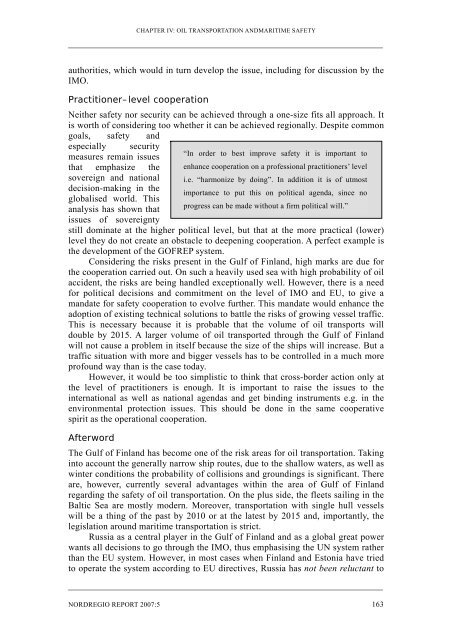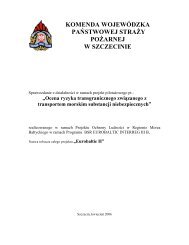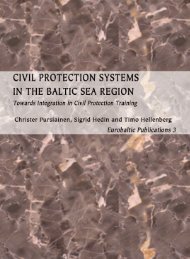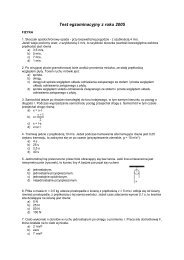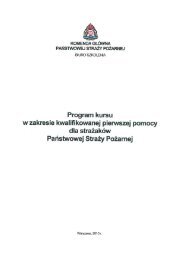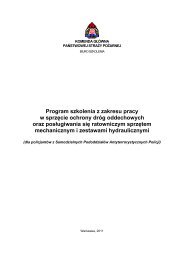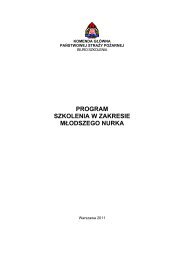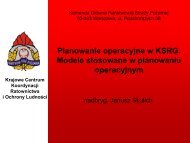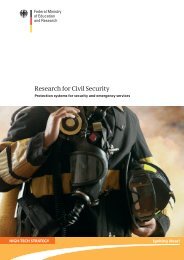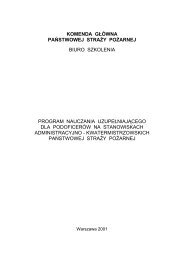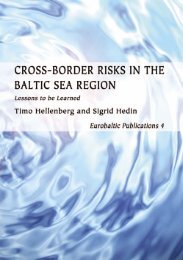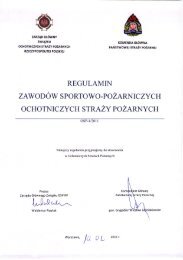Towards a Baltic Sea Region Strategy in Critical ... - Helsinki.fi
Towards a Baltic Sea Region Strategy in Critical ... - Helsinki.fi
Towards a Baltic Sea Region Strategy in Critical ... - Helsinki.fi
Create successful ePaper yourself
Turn your PDF publications into a flip-book with our unique Google optimized e-Paper software.
CHAPTER IV: OIL TRANSPORTATION ANDMARITIME SAFETY<br />
authorities, which would <strong>in</strong> turn develop the issue, <strong>in</strong>clud<strong>in</strong>g for discussion by the<br />
IMO.<br />
Practitioner–level cooperation<br />
Neither safety nor security can be achieved through a one-size <strong>fi</strong>ts all approach. It<br />
is worth of consider<strong>in</strong>g too whether it can be achieved regionally. Despite common<br />
goals, safety and<br />
especially security<br />
measures rema<strong>in</strong> issues<br />
“In order to best improve safety it is important to<br />
that emphasize the enhance cooperation on a professional practitioners’ level<br />
sovereign and national i.e. “harmonize by do<strong>in</strong>g”. In addition it is of utmost<br />
decision-mak<strong>in</strong>g <strong>in</strong> the<br />
importance to put this on political agenda, s<strong>in</strong>ce no<br />
globalised world. This<br />
analysis has shown that<br />
progress can be made without a <strong>fi</strong>rm political will.”<br />
issues of sovereignty<br />
still dom<strong>in</strong>ate at the higher political level, but that at the more practical (lower)<br />
level they do not create an obstacle to deepen<strong>in</strong>g cooperation. A perfect example is<br />
the development of the GOFREP system.<br />
Consider<strong>in</strong>g the risks present <strong>in</strong> the Gulf of F<strong>in</strong>land, high marks are due for<br />
the cooperation carried out. On such a heavily used sea with high probability of oil<br />
accident, the risks are be<strong>in</strong>g handled exceptionally well. However, there is a need<br />
for political decisions and commitment on the level of IMO and EU, to give a<br />
mandate for safety cooperation to evolve further. This mandate would enhance the<br />
adoption of exist<strong>in</strong>g technical solutions to battle the risks of grow<strong>in</strong>g vessel traf<strong>fi</strong>c.<br />
This is necessary because it is probable that the volume of oil transports will<br />
double by 2015. A larger volume of oil transported through the Gulf of F<strong>in</strong>land<br />
will not cause a problem <strong>in</strong> itself because the size of the ships will <strong>in</strong>crease. But a<br />
traf<strong>fi</strong>c situation with more and bigger vessels has to be controlled <strong>in</strong> a much more<br />
profound way than is the case today.<br />
However, it would be too simplistic to th<strong>in</strong>k that cross-border action only at<br />
the level of practitioners is enough. It is important to raise the issues to the<br />
<strong>in</strong>ternational as well as national agendas and get b<strong>in</strong>d<strong>in</strong>g <strong>in</strong>struments e.g. <strong>in</strong> the<br />
environmental protection issues. This should be done <strong>in</strong> the same cooperative<br />
spirit as the operational cooperation.<br />
Afterword<br />
The Gulf of F<strong>in</strong>land has become one of the risk areas for oil transportation. Tak<strong>in</strong>g<br />
<strong>in</strong>to account the generally narrow ship routes, due to the shallow waters, as well as<br />
w<strong>in</strong>ter conditions the probability of collisions and ground<strong>in</strong>gs is signi<strong>fi</strong>cant. There<br />
are, however, currently several advantages with<strong>in</strong> the area of Gulf of F<strong>in</strong>land<br />
regard<strong>in</strong>g the safety of oil transportation. On the plus side, the fleets sail<strong>in</strong>g <strong>in</strong> the<br />
<strong>Baltic</strong> <strong>Sea</strong> are mostly modern. Moreover, transportation with s<strong>in</strong>gle hull vessels<br />
will be a th<strong>in</strong>g of the past by 2010 or at the latest by 2015 and, importantly, the<br />
legislation around maritime transportation is strict.<br />
Russia as a central player <strong>in</strong> the Gulf of F<strong>in</strong>land and as a global great power<br />
wants all decisions to go through the IMO, thus emphasis<strong>in</strong>g the UN system rather<br />
than the EU system. However, <strong>in</strong> most cases when F<strong>in</strong>land and Estonia have tried<br />
to operate the system accord<strong>in</strong>g to EU directives, Russia has not been reluctant to<br />
NORDREGIO REPORT 2007:5 163


